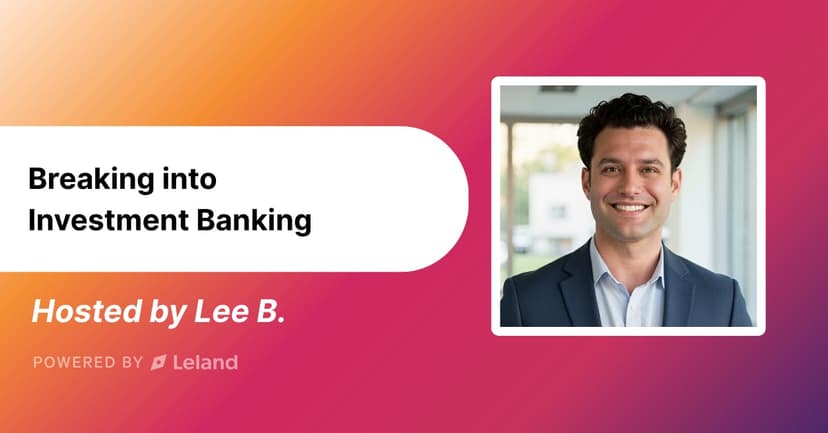Preparing for Success: Top 10 Questions Asked in Investment Bank Interviews
If you're preparing for an investment bank interview, you need to know the top 10 questions that are commonly asked.
Posted June 13, 2025

Join a free event
Learn from top coaches and industry experts in live, interactive sessions you can join for free.
Table of Contents
If you're looking to pursue a career in investment banking, you need to prepare yourself for the rigors of the interview process. Investment banks are renowned for their exhaustive, multi-round interview processes, which test candidates on a range of competencies and skills. In this article, we'll explore the top 10 questions asked in investment bank interviews, and provide in-depth guidance on how to prepare yourself to nail them.
Introduction: Understanding the Investment Banking Industry
Before we delve into the specifics of investment bank interviews, let's take a look at the industry itself. Investment banking is a fast-paced, high-pressure industry that involves advising clients on mergers and acquisitions, underwriting and selling stocks and bonds, and providing strategic advice on corporate finance matters. It's a highly competitive field that attracts some of the brightest and most driven professionals around the world.
One of the key factors that sets investment banking apart from other areas of finance is the emphasis on building and maintaining relationships with clients. Investment bankers must be able to establish trust and credibility with their clients, as they are often dealing with sensitive and confidential information. This requires strong communication and interpersonal skills, as well as the ability to think creatively and strategically to solve complex financial problems.
The Importance of Preparation for Investment Bank Interviews
If you're serious about securing a job in investment banking, you need to prepare yourself thoroughly for the interview process. This involves researching the firm you're applying to, practicing your interview skills, and developing a deep understanding of the industry and its dynamics. Most investment banks look for candidates who have an unwavering attention to detail, strong interpersonal skills, and a passion for finance and business.
One important aspect of preparing for investment bank interviews is to be familiar with the current market trends and news. This can include staying up-to-date with the latest mergers and acquisitions, economic indicators, and regulatory changes. Being knowledgeable about these topics can demonstrate your interest and commitment to the industry, and can also help you answer questions more confidently during the interview. Additionally, it's important to practice your communication skills and be able to articulate your thoughts clearly and concisely. This can involve practicing with a friend or mentor, or even recording yourself and reviewing your performance. By taking the time to prepare thoroughly, you can increase your chances of success in the competitive world of investment banking.
Top 10 Questions Asked in Investment Bank Interviews: An Overview
Now let's delve into the top 10 questions you're likely to encounter in an investment bank interview:
- Tell me about yourself.
- Why do you want to work in investment banking?
- What are your strengths and weaknesses?
- What motivates you?
- Can you walk me through a DCF model?
- Can you explain how an IPO works?
- What are the key risks in a potential M&A deal?
- What current events in the financial world interest you?
- How do you prioritize tasks when you have multiple projects due?
- Why should we hire you?
It's important to note that while these are the top 10 questions asked in investment bank interviews, they are not the only questions you may encounter. Interviewers may also ask about your previous work experience, your educational background, and your knowledge of the industry.
Additionally, it's crucial to prepare for behavioral questions, which are designed to assess your ability to handle different situations and work effectively in a team. These questions may ask about a time when you had to overcome a challenge, how you handle conflict, or how you prioritize your workload.
How to Tackle Behavioral Questions in Investment Bank Interviews
Behavioral questions are designed to assess your ability to work with others, communicate effectively, and manage your time successfully. These questions often begin with an introductory phrase such as "tell me about a time when..." or "walk me through a situation where..." To ace these questions, you need to prepare by thinking through different scenarios and coming up with examples of how you have demonstrated specific competencies in past experiences.
One important thing to keep in mind when answering behavioral questions is to be specific and provide details. Avoid giving vague or general answers, as they may not fully demonstrate your abilities. Instead, provide concrete examples of how you handled a situation, what actions you took, and what the outcome was.
It's also important to remember that behavioral questions are not just about your technical skills, but also about your personality and character. Interviewers want to see how you handle difficult situations, how you work with others, and how you handle stress. So, when preparing for these questions, think about not only your technical skills, but also your personal qualities and how they have helped you succeed in the past.
Technical Questions: Essential Knowledge and Preparation Tips
Technical questions are designed to test your knowledge of finance and accounting principles, as well as your ability to apply them to real-world scenarios. Common technical questions include topics such as valuations, financial statements, and economic trends. To excel in these questions, you should prepare beforehand by reading up on the relevant topics, practicing your math skills, and doing mock interviews with friends or mentors.
It is also important to stay up-to-date with the latest industry trends and news. This can be achieved by subscribing to financial publications, attending industry conferences, and networking with professionals in the field. By staying informed, you can demonstrate your knowledge and passion for the industry during the interview.
Additionally, it is important to be able to communicate your technical knowledge effectively. This means being able to explain complex financial concepts in a clear and concise manner. Practice explaining technical concepts to non-experts, such as friends or family members, to improve your communication skills.
Common Mistakes to Avoid During Investment Bank Interviews
There are many common mistakes that candidates make during investment bank interviews, including failing to prepare adequately, giving overly rehearsed answers, or demonstrating poor communication skills. To avoid these pitfalls, you should prepare thoroughly beforehand, ensure that you're well-rested and mentally alert, and practice active listening during the interview itself. Remember, the interviewer is looking for candidates who can demonstrate a deep understanding of the industry and its nuances, as well as a genuine passion for the work.
Another common mistake that candidates make during investment bank interviews is failing to ask thoughtful questions. Remember, the interview is a two-way conversation, and asking insightful questions can demonstrate your interest in the company and your ability to think critically. Some good questions to ask might include inquiring about the company culture, asking about the interviewer's own experiences at the firm, or seeking clarification on specific aspects of the job description. By asking thoughtful questions, you can leave a lasting impression on the interviewer and show that you're truly invested in the opportunity.
How to Demonstrate Your Fit with the Company Culture
Investment banks often place a high value on team dynamics and cultural fit when evaluating candidates. To demonstrate that you're a good fit, you should research the company culture beforehand, understand its values and mission, and prepare examples of how you have worked successfully in team settings in the past. You should also aim to be personable and engaging during the interview, making an effort to connect with your interviewer on a personal level.
Another way to demonstrate your fit with the company culture is to showcase your passion for the industry and the company's mission. This can be done by discussing any relevant experiences or projects you have worked on that align with the company's values. Additionally, showing a willingness to learn and adapt to the company's culture can also make a positive impression on the interviewer. It's important to remember that cultural fit is a two-way street, and you should also evaluate whether the company's culture aligns with your own values and work style.
Navigating Group and Case Study Interviews Successfully
Group and case study interviews are commonly used in the investment banking industry to evaluate candidates' teamwork and problem-solving skills. To prepare for these types of interviews, you should practice with other candidates in mock scenarios, develop a systematic approach to problem-solving, and be prepared to take a leadership role if necessary. During the interview itself, you should aim to be collaborative, articulate, and respectful of your teammates.
It is also important to remember that the interviewer is not only evaluating your technical skills but also your interpersonal skills. Therefore, it is crucial to actively listen to your teammates, acknowledge their contributions, and provide constructive feedback. Additionally, you should be able to adapt to different personalities and work styles to ensure effective collaboration. By demonstrating strong teamwork and problem-solving skills, you can increase your chances of success in group and case study interviews.
Preparing for Follow-Up Questions and Closing the Interview Strongly
Investment bank interviews often involve several rounds of questioning, with follow-up questions designed to dig deeper into specific areas of your experience or knowledge base. To prepare for these questions, you should be ready to elaborate on your previous answers in greater detail, provide relevant examples, and ask thoughtful questions of your interviewer. You should also aim to close the interview strongly, thanking your interviewer for their time and expressing your continued interest in the position.
It is important to note that follow-up questions may not always be related to your professional experience or knowledge. Interviewers may also ask behavioral or situational questions to assess your problem-solving skills and ability to handle difficult situations. In such cases, it is important to remain calm and composed, and provide a well-thought-out response that showcases your ability to handle challenging scenarios.
The Role of Networking in Securing an Investment Banking Job
Networking is an essential part of the investment banking recruiting process, and can often make the difference between securing a job and missing out. To network effectively, you should attend recruiting events, informational interviews, and industry conferences, as well as reaching out to alumni and other personal contacts. By building strong relationships with people in the industry, you can gain valuable insights into the culture and hiring practices of specific firms, as well as gaining referrals and introductions to potential employers.
Conclusion: Key Takeaways for Successful Investment Bank Interview Prep
In conclusion, preparing for investment bank interviews is a complex process that involves deep research, thorough preparation, and strong communication skills. By understanding the top 10 questions asked in these interviews, developing a strategy for tackling both behavioral and technical questions, and avoiding common pitfalls, you can increase your chances of success. Additionally, by being personable, engaging, and remaining committed to the industry and your career goals, you can demonstrate your cultural fit and become a desirable candidate for your dream investment banking job.
Browse hundreds of expert coaches
Leland coaches have helped thousands of people achieve their goals. A dedicated mentor can make all the difference.



















